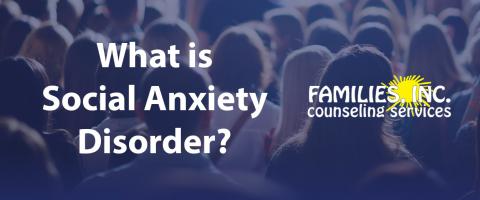
Do you find yourself getting nervous in social situations? Have difficulty talking to strangers or worry too much about what other people may think about you?
It’s completely normal to fear being judged by others, but sometimes we can let it go overboard. Giving too much energy to negative thoughts and deeming most of our social interactions as flawed or inadequate may be the sign of a social anxiety disorder.
What is Social Anxiety?
Social anxiety disorder is a mental health condition characterized by a persistent fear of being judged or scrutinized by others in a social or performance situation. This often involves worrying that peers will take note of one’s nervousness through physical cues like getting red in the face, tensing up, having a nervous tick, rapid heart rate or a trembling voice.
For someone with social anxiety, making and maintaining eye contact can feel like climbing Mount Everest. Giving a presentation at work or school may be the cause of great distress and lead to skipping the obligation all together.
Left untreated, this sort of avoidant behavior can become very disruptive in one’s life. Everyday interactions such as going out to eat with a group of friends or speaking to a cashier at the grocery store can become terribly daunting tasks.
This in turn often lead to issues with self-esteem and the inability to assert oneself in moments that really matter. Performance at work or school often deteriorates and the likelihood of substance abuse and depression increases significantly.
What Are the Underlying Causes?
While there is no singular cause of social anxiety, there are several contributing factors that can be observed.
- Genetics
Studies have shown that anxiety often runs in the family. You may have genes that predispose you to developing the disorder, though just because a parent has it doesn’t mean you’ll inherit the trait.
- Environment
We are all influenced by the environment in which we grew up and whatever social settings we find ourselves in throughout life. Social anxiety disorder can be learned from a caretaker by observing how they interact with others and picking up their habits.
An overprotective, controlling or abusive parent can also cause long lasting trauma that leads to disorders later in life. Additionally, growing up in a situation where one is not able to develop certain social skills can lead to disorders down the line.
- Direct Conditioning
A specific event like being teased in your elementary school cafeteria or forgetting lines in a class play can trigger waves of anxiety years after the fact.
How Can You Deal with Social Anxiety?
If symptoms persist for 6 months or longer, you should consider speaking to a mental health professional. After an official diagnosis, a therapist can help make a plan to get you on track toward positive change. With their support, you can develop skills that will help you deal with anxiety when it arises and gradually react to stressful situations from a calm and collected place.
If you or a loved one are experiencing symptoms of anxiety, depression or any other mental health disorders, consider speaking to a therapist or related professional.
Our friendly and compassionate mental health experts at Families, Inc are here to help. Give us a call or visit us at one of our 11 local clinics in Arkansas. Together, we can help you enjoy a healthier, happier life.


